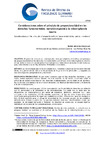Please use this identifier to cite or link to this item:
https://accedacris.ulpgc.es/jspui/handle/10553/114427
| Title: | Consideraciones sobre el principio de proporcionalidad en los derechos fundamentales: mención especial a la videovigilancia masiva | Other Titles: | Considerations on the principle of proportionality in fundamental rights: special mention of mass video-surveillance | Authors: | Miranda Goncalves, Rubén | UNESCO Clasification: | 560504 Derecho constitucional | Keywords: | Data Protection Fundamental Rights Mass Video Surveillance Principle Of Proportionality Right To Privacy, et al |
Issue Date: | 2021 | Publisher: | Faculdade Guanambi | Journal: | Revista De Direito Da Faculdade Guanambi | Abstract: | This research study aims to analyze the principle of proportionality in fundamental rights with emphasis on mass video surveillance, which must be taken into account to avoid a possible violation of fundamental rights, as we argue that there are no unlimited or absolute rights. METHOD: The methodology used in this work focuses on the deductive method, starting from a series of premises from the general to the particular, combined with a jurisprudential and doctrinal research. RELEVANCE/ORIGINALITY: It is common knowledge that there are no absolute rights and, therefore, certain limits must be applied. In this sense, a study has been made on the principle of proportionality in fundamental rights in order to weigh the conflicts that may arise between the right to freedom of information and the right to personal privacy. RESULTS: It is concluded that: (1) Concern about the loss of rights in relation to priva cy or intimacy has increased; (2) Video surveillance devices are increasingly used by companies, government, individuals etc., to monitor individuals; (3) On many occasions, the use of these devices is justified to ensure citizen security or prevent infrin gements, but this is not always the case; (4) This issue puts people's privacy at risk since, if certain limits or guarantees are not complied with, fundamental rights may be violated, such as, for example, personal or family privacy, freedom of expression, individual freedom itself, secrecy of communications, among others. THEORETICAL/METHODOLOGICAL CONTRIBUTIONS: Within this context, the proposed study will focus on the analysis of the limits of video surveillance and whether this recording mechanism violates fundamental rights. OBJETIVO: El presente estudio de investigación tiene por objetivo el análisis del principio de proporcionalidad en los derechos fundamentales con énfasis en la videovigilancia masiva, el cual debe tenerse en cuenta para evitar una posible violación de derechos fundamentales, pues defendemos que no hay derechos ilimitados o absolutos. MÉTODO: La metodología que se ha empleado en el presente trabajo se centra en el método deductivo, partiendo de una serie de premisas de lo general a lo particular, conjugada con una investigación jurisprudencia y doctrinal. RELEVANCIA/ORIGINALIDAD: Es por todos conocido que no hay derechos absolutos y, por tanto, deben aplicarse ciertos límites. En este sentido, se ha hecho un estudio sobre el principio de proporcionalidad en los derechos fundamentales con el objetivo de ponderar los conflictos que puedan darse entre el derecho a la libertad de información y el derecho a la intimidad personal. RESULTADOS: Se concluye que: (1) La preocupación por la pérdida de derechos en relación con la privacidad o la intimidad se ha incrementado; (2) Cada vez se usan más los dispositivos de videovigilancia por parte de empresas, gobierno, personas etc., para controlar a los individuos; (3) En muchas ocasiones, el uso de estos dispositivos está justificado para garantizar la seguridad ciudadana o evitar infracciones, pero no siempre es así; (4) Esta cuestión pone en riesgo la privacidad de las personas ya que, de no cumplirse determinados límites o garantías, se podrán vulnerar derechos fundamentales como, por ejemplo, la intimidad personal o familiar, la libertad de expresión, la propia libertad individual, el secreto de las comunicaciones, entre otros. CONTRIBUCIONES TEÓRICAS/METODOLÓGICAS: Dentro de este contexto, el estudio que se propone realizar se centrará en el análisis de los límites de la videovigilancia y si ese mecanismo de grabación vulnera los derechos fundamentales. |
URI: | https://accedacris.ulpgc.es/handle/10553/114427 | ISSN: | 2447-6536 | DOI: | 10.29293/rdfg.v8i02.359 | Source: | Revista de Direito da Faculdade Guanambi [ISSN 2447-6536], v. 8 (2) | URL: | http://dialnet.unirioja.es/servlet/articulo?codigo=8241425 |
| Appears in Collections: | Artículos |
SCOPUSTM
Citations
3
checked on Jun 8, 2025
Page view(s)
347
checked on Jan 15, 2026
Download(s)
110
checked on Jan 15, 2026
Google ScholarTM
Check
Altmetric
Share
Export metadata
Items in accedaCRIS are protected by copyright, with all rights reserved, unless otherwise indicated.
